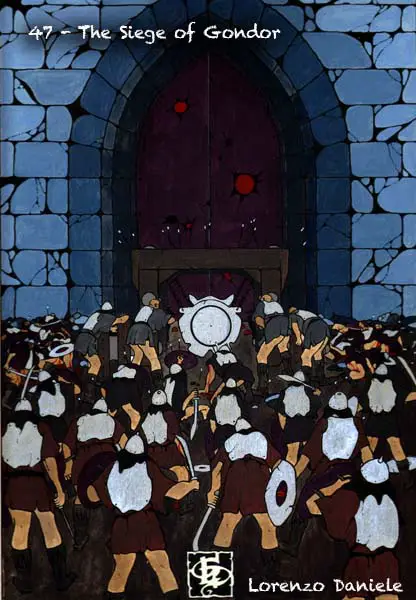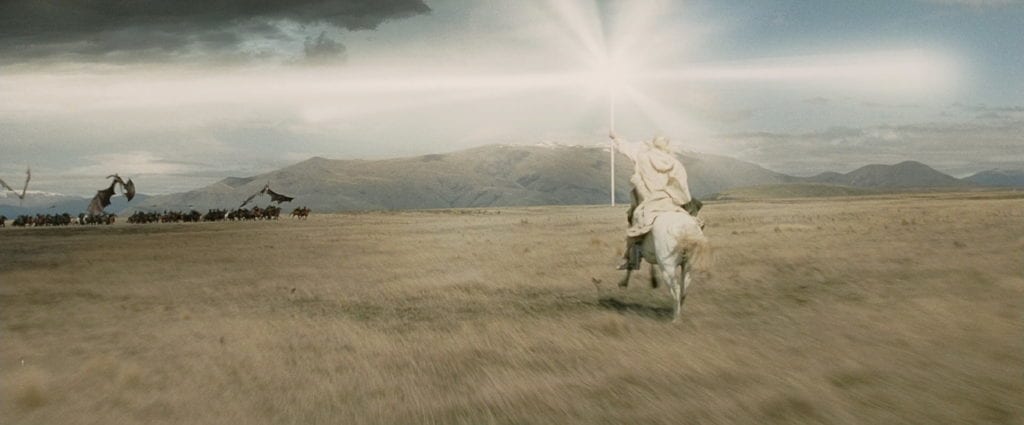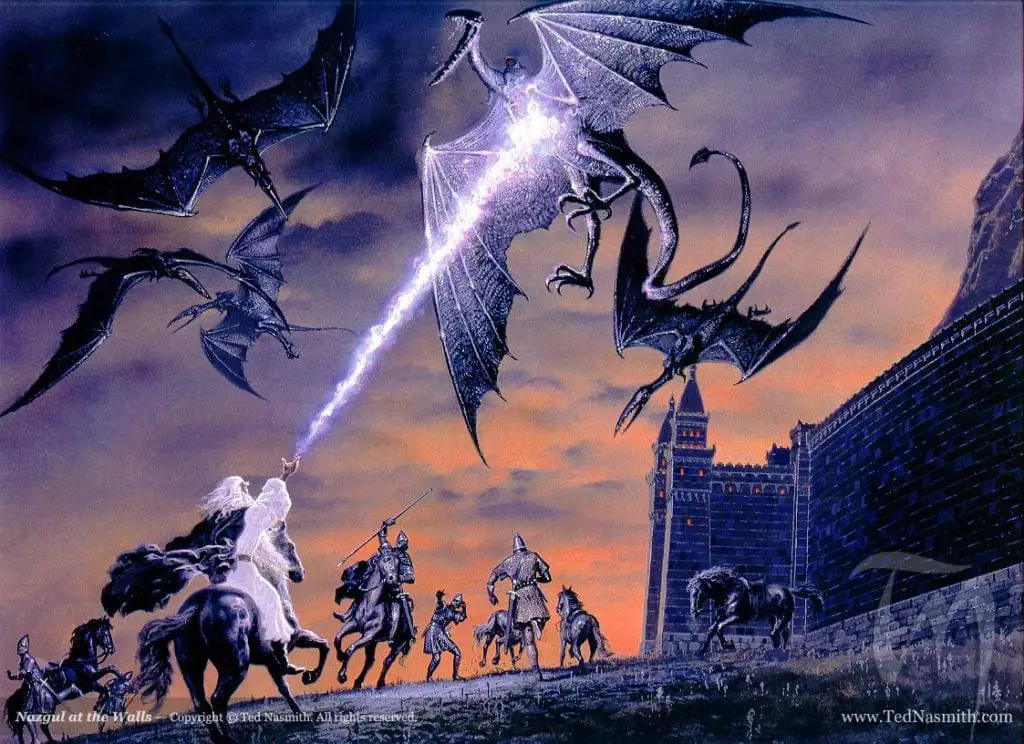J.R.R. Tolkien, as he would like you to keep in mind, was not a fan of allegory. He states in his letters, on twelve or thirteen different occasions, that he does not like allegory and that he is not allegorically-minded. In the introduction to The Lord of the Rings he bluntly states, “I cordially dislike allegory in all its manifestations… I much prefer history, true or feigned, with its varied applicability.” There’s a rote-ness to his objections, and they are asserted every time the subject of allegory is even obliquely mentioned. It’s an argument that Tolkien seems used to countering.
“The Siege of Gondor” is one of the better examples of why Tolkien’s work can feel so allegorical, and why it ultimately is not. The siege, as it unfolds, is filled with tension and violence. Fiery projectiles smash into people and walls, a magicked wolf-demon battering-ram smashes through the front gate, severed heads get launched into the city. A siege is never pretty. But in “The Siege of Gondor,” the battle often feels existential more than physical. The tension between light and darkness, hope and despair is ubiquitous: it culminates with face-off between the Witch-King, a dark despair-monster, and Gandalf, decked out in white and radiating hopeful light. The momentum of the siege is largely measured in how much despair the Nazgul are able to inject into the men of Gondor lining the battlements. It’s an obvious, rather tropey vision of a fantasy battle, echoes of which can be seen trailing down the decades of subsequent fantasy epics.
But this sort of battle, and this sort of conflict, is not necessarily the focus of “The Siege of Gondor.” There is a battle happening, of course, that is drenched in morally-coded language. One that could easily be extrapolated into allegory. But before it’s simply written off as such, it’s helpful to take a look at what Tolkien actually thought it meant, and how it fit into storytelling. And the best place to do this is probably Tolkien’s letter to Stanley Unwin, after Unwin’s son Rayner read Tolkien’s manuscript and passed on his impressions.
Do not let Rayner suspect “allegory.” There is a moral, I suppose, in any tale worth telling. But that is not the same thing. Even the struggle between darkness and light (as he calls it, not me) is for me just a particular phase of history, one example of its pattern, perhaps, but not The Pattern; and the actors are individuals–they each, of course, contain universals, or they would not live at all, but they never represent them as such.
And that brings us around to the real focus of “The Siege of Gondor”: Denethor.
Hope, Despair, and Denethor
 I was pretty taken by the second half of that letter excerpt. Tolkien’s story is fixed in time, even an imagined time. It is the result of specific events rather than universal principles (though an echo of the latter can always be dug up). And Tolkien’s characters are people. Their actions resonate with universals (there’s that Neoplatonism again!) but are not embodiments of them. It’s a story of people and their context. Universal principles are present, but incidental.
I was pretty taken by the second half of that letter excerpt. Tolkien’s story is fixed in time, even an imagined time. It is the result of specific events rather than universal principles (though an echo of the latter can always be dug up). And Tolkien’s characters are people. Their actions resonate with universals (there’s that Neoplatonism again!) but are not embodiments of them. It’s a story of people and their context. Universal principles are present, but incidental.
Denethor is the best instance of this. Of course, he’s a case study in despair. The chapter’s climax features him marching off to his mausoleum, scaring all his guards, and flamboyantly declaring:
Better to burn sooner than later, for burn we must. Go back to your bonfire! And I? I will go now to my pyre. To my pyre! No tomb for Denethor and Faramir. No tomb! We will burn like heathen kings before ever a ship sailed hither from the West. The West has failed.
It would be easy to cast Denethor as the anti-Aragorn or anti-Faramir, falling into a despairing madness as the other two face grim fates with quiet and stoic resolve. He would function as a type or a counter, a foil for the protagonists who matter more in the long run.
But Denethor never manages to be—in Tolkien’s terms—quite representative of that sort of universal. He is too much a person of his moment, driven by a complex web of insecurities both political and personal. Throughout the chapter he flickers between cruelty, despair, pettiness, and arrogance. His fall, here and over the next few chapters, is not an abstract symbol. Denethor is a messy entirety of a person, his despair a statement of itself rather than a reference to something more abstract.
Denethor as Steward
Denethor’s despair is intrinsically rooted in his position as steward. He comes from an impossibly old house, handed down from son to son, ancient and illustrious even when Gondor’s origins and history had started to become brittle. He sees Gondor both as the only beacon of light in the world and as teetering on the edge of utter failure. He sees himself as a bulwark against evil and as the dimming conclusion to a fading house. And he sees himself as tied to the fate of Gondor intrinsically, a position that fills him with fear and pride that often burst out in fits of cruelty, arrogance, and astonishing levels of pettiness.
This myopic view of the world was apparent from Denethor’s first appearance, when Gandalf chided him for being a steward only to those immediately around him (a criticism he levels again here in “The Siege of Gondor”). The arrogance and fear this engenders is apparent throughout the chapter. When mentioning to Pippin that all great lords use other men as their weapons—drawing a direct, concerning parallel between himself and Sauron—Denethor feels the need to insist that this is not due to necessity but choice:
He stood up now and cast open his long black cloak, and behold! He was clad in mail beneath, and girt with a long sword, great hilted in a sheath of black and silver. “Thus have I walked, and thus now for many years have I slept,” he said, “lest with age the body should grow soft and timid.”
There is a flamboyant, performative element to Denethor’s leadership. He is utterly disengaged from his people (once again, it’s difficult not to hold Théoden in contrast). He asserts an abstract sort of leadership, decked out in secret clothes of austerity that affect only his own perception of himself. And he spends too much time inside his own head, to the extent that, in his position as steward, he increasingly sees the fate of himself and his whole society as intertwined. When Faramir returns, injured and on the edge of death, Denethor seems to imply that the end of his own line and the end of Gondor are linked.
Nay, nay, whatever may now betide in war, my line too is ending, even the House of Stewards has failed. Mean folk shall rule the last remnant of the Kings of Men, lurking in the hills until all are hounded out.
As his line extinguishes, so does Gondor. And later in the chapter, as he prepares to burn himself and Faramir, the reverse seems to be true as well. “We will burn like heathen kings before ever a ship sailed hither from the West,” he states. “The West has failed.

Denethor as Father
Beyond his role as steward, Denthor’s despair is also rooted in his role as a father – particularly as a bereaved one. He is abjectly terrible to Faramir in this chapter. He’s routinely petty and dismissive, snapping back abuse at innocuous questions.
“I hope I have not done ill?” He looked at his father.
“Ill?” cried Denethor, and his eyes flashed suddenly. “Why do you ask? The men were under your command. Or do you ask for my judgement on all your deeds? Your bearing is lowly in my presence, yet it is long now since you turned from your own way at my counsel. See, you have spoken skillfully, as ever; but I, have I not seen your eye fixed on Mithrandir, seeking whether you said well or too much? He has long had your heart in his keeping.”
It seems like a baffling response to a deferential question, until the end. Denethor spends “The Siege of Gondor” both jealous and in mourning, grieving for Boromir and resenting Faramir for his relationship with Gandalf. He even—continuing on from “Minas Tirith”— seems to despise Faramir because of the similarities that they share.
“If what I have done displeases you, father,” said Faramir quietly, “I wish had known your counsel before the burden of so weighty a judgement was thrust on me.”
“Would that have availed you to change your judgement?” said Denethor. “You would still have done just so, I deem. I know you well. Ever your desire is to appear lordly and generous as a king of old, gracious, gentle. That may well befit one of high race, if he sits in power and peace. But in desperate hours gentleness may be repaid with death.”
“So be it,” said Faramir.
“So be it!” cried Denethor. “But not with your death only, Lord Faramir: with the death also of your father, and of all your people, whom it is your part to protect now that Boromir is gone.”
There is the sense that Denethor is not only grieving the death of one son and the perceived estrangement of the other, but also grieving that Faramir embodies the sort of leadership that his own time and position seemed to deny him. It is a luxury, Denethor seems to think, to be generous and gentle. To see his son practice it while he believes he cannot only seems to accelerate his resentment. And this, of course, leads to Denethor’s twofold denunciation of Faramir: telling him that he wished he had died in Boromir’s place, and then sending him out, “unthanked and unblessed,” to die in Osgiliath.
So many of Denethor’s problems are problems of his own making. He feels perpetually trapped inside his own head, old habits and conceptions grinding deeper into furrows from which he’s trying to climb out. This only grows with the revelations coming up in “The Pyre of Denethor.” Yet despite this, I always find there to be something very pitiable about Denethor, despite his coldness and his cruelty. He feels trapped in a cycle of poor decisions, powered by his place in the world and his fears and insecurities. He contains universals, as Tolkien would say. But he doesn’t stand in place of them.

Final Points
- While I spend most of my time here on Denethor, the siege elements worked very well for me. The first fires springing up on the distance and a low rumbling, the utter rout of Faramir’s host at Osgiliath, the unrestrained unpleasantness of the siege itself. It is dark, relentless, and distressing, and Tolkien does well in conveying the weight of the army swelling in like a wave and the chaos of Minas Tirith’s desperate and apparently insufficient response.
- I also quite liked this line, when the walls of the Pelennor first came down. Now ever and anon there was a red flash, and slowly through the heavy air dull rumbles could be heard. “They have taken the wall!” men cried. “They are blasting breaches in it! They are coming!” It’s a nice echo of the final lines in the Book of Mazerbul in Moria.
- The fact that Gandalf, often more austere and implacable after his Balrog fight and makeover, trembles during Faramir’s story is a nice and subtle indicator of how intense Frodo’s mission is, even though he’s been off-screen a while. His distress over hearing that they are passing through the Morgul Vale does the same, especially since we’re about halfway through Book V.
- I enjoyed that, near the chapter’s start, Denethor is once again compared to a spider. I am unsure if there is a higher comparative purpose to it or if Tolkien just likes/hates spiders.
- Pippin’s description of Faramir is nice as well: “the face of one who has been assailed by a great fear or anguish, but has mastered it and is now quiet… here was one with an air of high nobility such as Aragorn at times revealed, less high perhaps, yet also less incalculable and remote: one of the Kings of the Men born into a later time, but touched with the wisdom and sadness of the Elder Race.” There’s a hopefulness in that description that’s touching, the depiction of Faramir as something old and new at the same time.
- Prose Prize: At that moment he caught a flash of white and silver coming from the North, like a small star down on the dusky fields. It moved with the speed of an arrow and grew as it came, converging swiftly with the flight of the four men towards the Gate. It seemed to Pippin that a pale light was spread about it and the heavy shadows gave way before it. It’s a chapter of conversation more than pretty prose, but I did enjoy the “small star down on the dusky fields.” I am also probably slightly biased because I remember being very fond of Peter Jackson’s depiction of this moment; it’s one of my favorite shots of the trilogy.
- Contemporary to this chapter: While reading this, I hadn’t realized that quite so many days were passing! We’re covering March 10th to the very early hours of March 15th. This is largely concurrent with “The Ride of the Rohirrim,” coming up next. Rohan musters and rides out of Dunharrow, meets the Wild Men in Druadan Forest, and arrives at Pelennor Fields at dawn on the 15th. Frodo and Sam go from the Crossroads all the way through their encounter with Shelob. And as Minas Tirith is being besieged, Sam is making his way to rescue Frodo in Cirith Ungol. A busy couple of days in Middle-earth!

